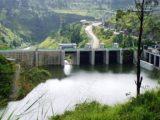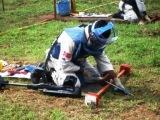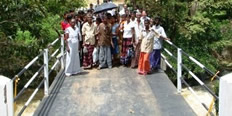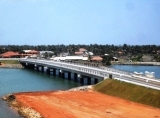The Embassy of Japan in Sri Lanka is also accredited to the Republic of Maldives
|
Overview of Japan's Economic Cooperation to Sri Lanka Japan’s cordial relationship with Sri Lanka dates back to 1952, when Japan established diplomatic relations with Sri Lanka (then Ceylon). Since then, Japan has been a long- time partner in Sri Lanka’s socio-economic development as well as in the process of peace enhancement and reconciliation. Japan has also promptly provided relief and reconstruction assistance for conflict affected communities and those affected by natural disasters such as floods, droughts and tsunami.
As of the end of December 2010, the Government of Japan has provided around 1,100 billion Japanese Yen (JY) (approximately Rs. 1,400 billion) as assistance to Sri Lanka under its various funding schemes that have benefitted people in all parts of the country including those in conflict affected areas. This assistance is provided through several funding schemes such as Grant Assistance, Technical Cooperation, and Yen Loan scheme and mainly executed by the Japan International Cooperation Agency (JICA) in close cooperation with the Government of Sri Lanka. In addition, Japan provides support through UN Agencies, World Bank, Asian Development Bank and local, Japanese, and international NGOs. Japan’s assistance to Sri Lanka mainly focuses on two areas which are inter-related, and the assistance is expected to produce synergetic effects; 1. Consolidation of Peace and Reconstruction, and 2. Medium and Long-term Vision for Development In this context, Japan has engaged in the agendas of i) post conflict reconstruction, ii) socio-economic infrastructure, iii) poverty alleviation, iv) human resources development and v) climate change adaptation and mitigation.
|
The recent major assistance projects for socio-economic infrastructure include: i) improvement of Anuradhapura Teaching hospital by providing new facilities with medical equipment; ii) construction of Vavuniya- Kilinochchi Transmission Line, iii) improvement of central functions of Jaffna Teaching Hospital; iv) construction of the new Mannar Bridge and improvement of the Causeway; v) improvement of Kandy City Wastewater Management; vi) Eastern Province Water Supply Development; vii) Provincial/Rural Roads Development; viii) construction of Upper Kotmale Hydro Power; ix) development of Solar Electric Power Generation in Hambantota, x) construction of Southern Highway from Kottawa to Kurundugahahetekma, and xi) construction of the first section of the Outer Circular Highway in the outskirts of Colombo. These projects are expected to contribute not only to the development and welfare of all people of Sri Lanka, but also serve as a symbol of friendship between the people of Japan and the people of Sri Lanka. Especially, the projects in the Northern and the Eastern Provinces are expected to promote sustaining peace and reconciliation among all communities.
Under Japan’s Technical Cooperation, a total of 11,057 Sri Lankan professionals and students have been trained in various fields in Japan and 1,724 Japanese Experts ad 788 Japan Overseas Cooperation Volunteers (JOCVs) have been dispatched to Sri Lanka up to the end of March 2009. At present, 56 Volunteers are actively working at the grassroots level and over 20 Japanese experts are working with counterparts in relevant Ministries and institutions. In order to strengthen the capacity of Northern and Eastern provincial authorities, Japan is currently involved in a project to build capacity of the local officials concerned. In addition, there are several scholarships offered by the Government of Japan to young Sri Lankan public officers in various fields of expertise. 15 officers selected for the Human Resource Development scholarship are presently pursuing their post-graduate studies in three universities in Japan The Government of Japan also provides assistance to Sri Lanka through international agencies such as the World Bank, Asian Development Bank and UN Agencies via Japan Special Fund, Japan Fund for Poverty Reduction, Japan Social Development Fund, and Human Security Trust Fund etc. The Eastern and North Central Provincial Road Project, Poverty Reduction through Rural Infrastructure Maintenance, US$ 11 million (approximately Rs. 1,250 million) through IOM, UNHCR, UNICEF, and ICRC for providing shelter, food, water and sanitation to Internally Displaced Persons (IDPs) living in camps. In addition, US$ 7 million (approximately Rs.800 million) was provided through seven Japanese NGOs operating in Sri Lanka under the Japan Platform Fund to meet emergency humanitarian needs in conflict affected areas. |
||
Japan’s Role in the Private Sector of Sri Lanka Sri Lanka and Japan have enjoyed healthy bilateral relations in the area of trade and investments. In this regard, the Japanese presence in the private sector of this country has been maintained despite various challenges. Currently about sixty Japanese companies are operating in the country. As good corporate citizens of Sri Lanka, they have made a substantial contribution to Sri Lanka’s economy through creating employment, generating exports and transfer of technology to this country. In this regard, the Japanese Commerce and Industry Association in Sri Lanka are playing a coordinator role among the Japanese enterprises in Sri Lanka. The Japan External Trade Organization (JETRO) is playing an important role in further promoting bilateral trade between our two countries by disseminating trade related information and responding to various queries made by the Sri Lanka business sector.
Improving the business environment is very crucial at this stage, especially in the context of new investment opportunities that have emerged in the entire island including the Northern and the Eastern parts of the country. We hope that the Government of Sri Lanka will capture this opportunity by creating a stable macroeconomic environment and reducing the cost of doing business where businesses and industries could thrive. It is in this context that the Government-Private Joint Forum was launched last year, which forms a framework for improving the business environment for the Japanese companies operating in Sri Lanka. The regular discussions between the Sri Lankan Government, Japanese companies and the Embassy of Japan will not only benefit the Japanese companies, but will also contribute to improving the business environment in Sri Lanka. One significant event on promoting the Sri Lanka and Japanese businesses is the Joint Meeting of the Sri Lanka-Japan and Japan-Sri Lanka Business Co-operation Committees which is due to hold its 16th gathering in Tokyo in 2011. This event will provide opportunity for business partners to share experiences, meet new business partners, obtain guidance and insight on investment opportunities and forge new heights in promoting and enhancing Japanese investment, bilateral trade, and tourism between the two countries.
|
||
Country Assistance Policy to Sri LankaJune, 20131.The significance of the assistance to Sri Lanka
2. Basic policy(Long-term target): Promotion of economic growth in consideration of emerging regions
3. Priority areas (Mid-term target
Annex: Rolling Plan |
Copyright (C) 2012 Embassy of Japan in Sri Lanka Legal Matters | About Accessibility | Privacy Policy |
No.20, Srimath R.G. Senanayake Mawatha, Colombo7, Sri Lanka
Tel: +94-11-2693831/2693832/2693833
FAX: +94-11-2698629










